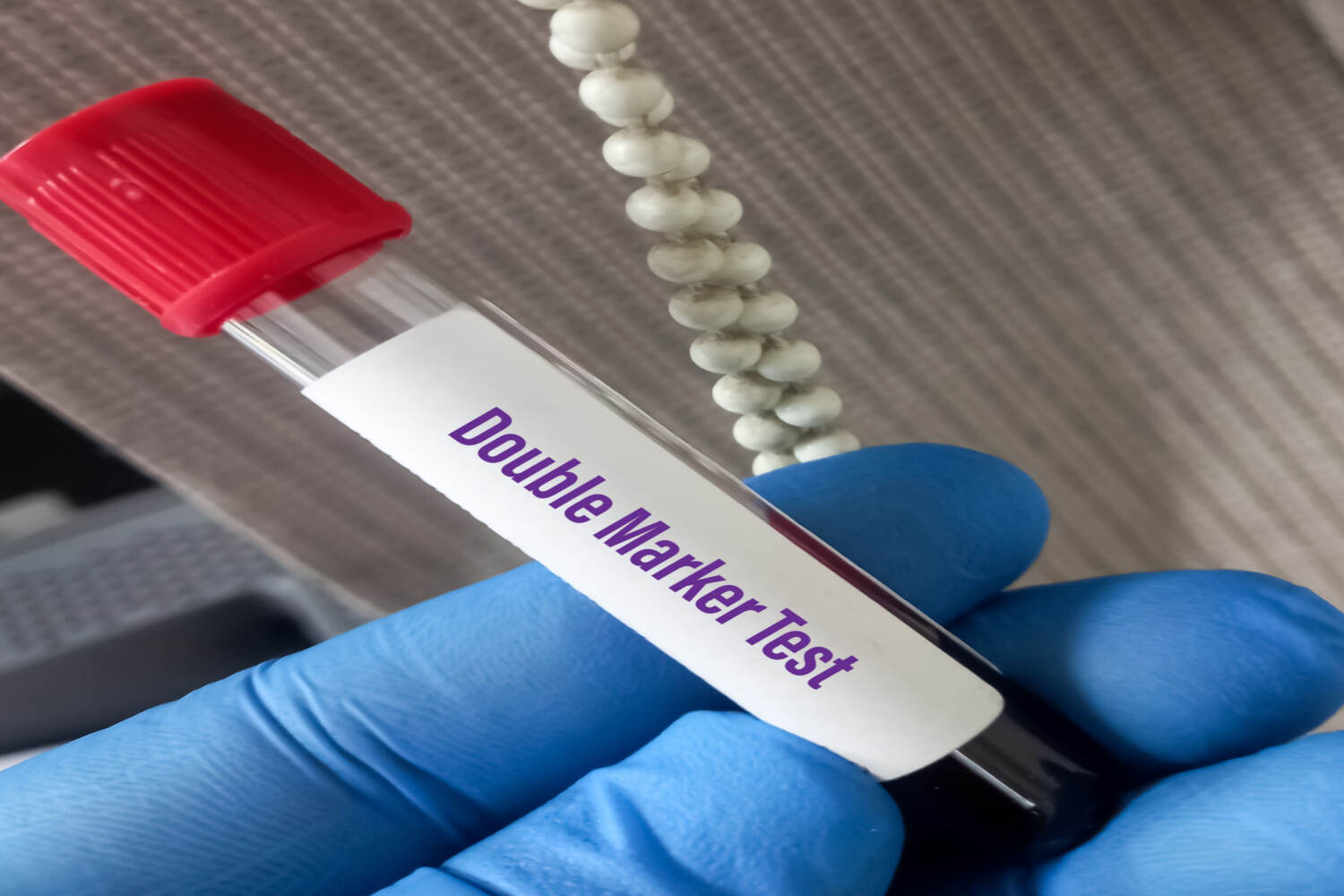 Earlier, any abnormalities in the fetus remained a mystery until the little one was born. We are now living in an era of advancement and development where you can check on growth and abnormalities as early as the first trimester. It is essential to identify and try to get things sorted out while the baby is still in the womb. The double marker or dual marker test during pregnancy helps to identify the abnormalities, if any, in the fetus and take the necessary steps to rectify them.
Earlier, any abnormalities in the fetus remained a mystery until the little one was born. We are now living in an era of advancement and development where you can check on growth and abnormalities as early as the first trimester. It is essential to identify and try to get things sorted out while the baby is still in the womb. The double marker or dual marker test during pregnancy helps to identify the abnormalities, if any, in the fetus and take the necessary steps to rectify them.
It is important to know about advanced diagnostic tests during pregnancy. In this article, we shall discuss in further detail the double marker test and why it is performed. Let us get started.
In This Article
- What is The Double Marker or Dual Marker Test?
- Why is The Double Marker Test Performed?
- How Does the Double Marker Test Work?
- When is The Double Marker Test Performed?
- How do You Prepare For a Double Marker Test?
- Interpreting Double Marker Test Results
- Double-Marker Test Vs. NT Scan
- FAQ’s
What is The Double Marker or Dual Marker Test?
The double marker or dual marker test measures two hormones: beta-hCG (beta-hCG) and PAPP-A (PAPP-A). The test is done on mothers’ blood. It is commonly known as maternal serum screening, which is a predictive test rather than a diagnostic one. The test can indicate the likelihood of chromosomal abnormalities in the fetus, if any.
To understand more clearly, the female fetus will have 22 sets of XX chromosomes, and a male fetus will have 22 sets of XY chromosomes. If, by any chance, any of the fetuses have an extra pair of chromosome 21, the chances of having Down syndrome are higher, which is also known as trisomy.
Another common abnormality is when the fetus has an extra pair of chromosome 18, which is known as Edward syndrome, and chromosome 13, also known as Patau’s syndrome. While the blood test is only indicative of an ultrasound, the nuchal translucency (NT) scan helps to have a clear look at the tissues on the back of the fetus’s neck to check for abnormalities.
Why is The Double Marker Test Performed?

The double marker test is usually performed to identify any chromosomal abnormalities. Especially if you have a family history of any abnormal disabilities or are over 35 years of age, the doctor advises a double marker test. Though the test is usually just a recommendation and not a compulsory requirement, many doctors prescribe it as a policy during the first trimester.
It is essential to understand that the test is only indicative of whether you are at a higher or lower risk of any abnormalities. You will not be able to get a detailed analysis of the abnormality, if any.
How Does the Double Marker Test Work?
The double marker test is performed on a blood sample taken from the mother. Based on the hormonal levels in the blood, the double marker test indicates whether the baby is at a higher or lower risk of chromosomal abnormalities. Beta-hCG and PAPP-A are glycoproteins glycoprotein which is commonly secreted by the placenta. When the levels of hCG are higher and PAPP-A is lower in the blood sample, the risk of chromosomal abnormalities is higher.
When is The Double Marker Test Performed?

The double marker test is usually performed in the first trimester between the 11th and 14th weeks of pregnancy. This is the best period to perform the procedure. Your blood may not show accurate results after the time window is closed. The chances for testing are very narrow and confined to the last weeks of the first trimester or in the early second trimester. A blood sample is taken, and the levels of pregnancy proteins are measured throughout the procedure.
How Do You Prepare For a Double Marker Test?
You need to be much more mentally prepared than physically for the double-marker test. Your doctor will be taking a sample of your blood along with an ultrasound. Other health reports, including IVF reports, if any, and the diabetic status of the patient, including the weight profile, will also be required before the procedure commences.
However, before deciding to take the test, you need to be mentally ready to face certain situations, including the following:
- If you know about the abnormality in advance, will it make your pregnancy phase worse and increase your anxiety?
- If your test results turn up as high risk, will you be ready or want to take up further intensive testing to know more about the abnormality?
- Will the test result make it difficult to manage the pregnancy?
Interpreting Double Marker Test Results

People usually find it challenging to interpret the results of the double-marker test. The results are represented in the form of ratios that indicate a low, moderate, or high risk of chromosomal abnormalities.
If your resultant ratio is 1:1000 or more, the risk of chromosomal abnormalities for the baby is likely to be lower, and the expectant mother is in a low-risk zone.
If your resultant ratio is between 1:10 and 1:250, you will be in the moderate-to-high-risk category for the likelihood of chromosomal abnormalities. In such situations, you must take the result to a genetic counselor to learn more about the condition. You can also take up several invasive tests, including non-invasive prenatal testing (NIPT), chorionic villus sampling, or amniocentesis, to get more definitive results. It is essential to note that some of these tests are very risky to undergo during pregnancy.
The main reason why double marker or dual marker testing is done during the early weeks of pregnancy is to identify and take further steps for the abnormalities early and during the available testing window.
Double-Marker Test Vs. NT Scan
The NT scan and the double marker test need to be performed, and the results must be combined to ascertain the final result of the procedure. Also when performed alone, an NT scan cannot give accurate results on the abnormalities.
The NT scan uses sound waves to capture the real-time image of the fetus. The blood sample is taken at the same time as the NT scan is performed. The results from both tests are correlated and combined to calculate the final result. This indicates the likelihood of any chromosomal abnormalities in the fetus.
To take the double marker test is absolutely your choice. There are both advantages and disadvantages to opting for the test. You need to understand the purpose of the test and how the results of the test are going to affect you mentally. If you are confused, you can always talk to your doctor about it and come to clarity before deciding to take or give up the test. Remember, there is absolutely zero risk in taking up the double or dual marker test. Have a happy and safe pregnancy!
FAQ’s
1. What is Considered a Normal Range For a Double Marker Test in Pregnancy?
For a normal range, the hCG needs to be between 25,700 and 2,88,000 mlU/ml for a double marker test during pregnancy.
2. How Accurate is a Dual Marker Test?
The dual marker or double marker test is only indicative and not a diagnostic test for abnormalities. However, it has an approximately accurate test with a sensitivity of 70 percent. A further amniocentesis test would be required for confirmation and definitive results.
3. Does a Double Marker Test Reveal the Gender of the Fetus?
No, the double marker test does not reveal the gender of the unborn baby. This is because the blood sample is taken at the end of the first trimester and in the early weeks of the second trimester, which is certainly not the window for gender determination.
4. Which Week is Best For The Dual Marker Test?
The time frame for taking the dual marker or the double marker test is very narrow during pregnancy. The period between the 11th and 14th weeks is considered best time for performing the dual marker test.
5. Are There Any Risks Associated With The Double Marker Test?
The double marker test is a non-invasive test, and there are absolutely no risk factors associated with performing the test. However, if you have any concerns, you should contact your doctor and follow their instructions beforehand.
